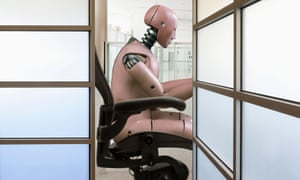
In a sense, it was surprising that 2016 was the year in which the social threat posed by rapid technological progress became a topic of serious and widespread discussion. It was, after all, the first year since 2007 when all of the world’s advanced economies managed to grow and in which unemployment rates fell across the rich world.
Yet those bright spots could not distract from other worries. Pay rises remain elusive for many workers, despite economic growth. Each day seems to bring new evidence of the massive economic disruption to come: from self-driving vehicles deployed by Tesla and Uber to experimentation with cashier-less shops by Amazon.
But the biggest warning signs that something in society has gone awry were the political shocks of Brexit and Donald Trump. These votes seemed to reflect not just a resentment at the elites who have captured most of the gains from recent economic growth, but also the dawning realisation that the economic and social marginalisation of whole classes of people might, thanks to technological change, become a permanent feature of the landscape.
The Digital Revolution has been growing in its transformative influence for decades, in the process undermining the economic power and indeed the very purpose of much of the workforce. Technology has allowed companies to move jobs to countries where wages and labour rules are more favourable, to automate away jobs altogether or to change the structure of markets in ways that reduce labourers’ autonomy and power.
As workers’ economic circumstances change, they have little choice but to try to get by – to compete against machines and against other similarly vulnerable workers – in an attempt to maintain a tenuous grip on the employment ladder. The intensity of this competition has held down wages. Stagnant rates of pay have in turn hobbled the economy, by making it harder for governments to manage the business cycle and by reducing the incentive within firms to invest in labour-saving, productivity-enhancing equipment.
Now we have begun to see how this stress translates into political conflict. It is increasingly clear to economists and technocratically minded politicians that economic growth alone is not nearly enough to satisfy the median voter. People also want secure, meaningful, well-compensated work. What is in doubt is whether the digital economy is capable of providing such jobs.
Hopes that tech startups might create new categories of good, mass employment for workers without university degrees have been dashed. Optimism that the gig economy might provide enough satisfying work to fill the gaps created by the disruption of the traditional economy has also met with disappointment.
It is increasingly apparent that a better world of work is not going to appear without a big helping hand from government policy. Shocking electoral results are the first evidence that political systems built for a different era are cracking under the demands of the digital economy.
In a world in which technology makes employment more precarious and less remunerative for many workers, redistribution will need to become much more generous and ubiquitous. But building a social consensus around that view, and building the political movement to bring it into being, is the work of generations. Meanwhile, the prospect of much greater redistribution can exacerbate tensions between different groups within society; those already of a mind to be suspicious of outsiders are anything but pleased at the possibility that more public money will flow to those unlike themselves.
Other market interventions – such as a more creative approach to education and training, a more ambitious response to regional inequities, or even efforts to provide work directly through public works projects – could help. Yet existing political parties and leaders appear to be unable to move forward on measures anywhere close in scale to what seems to be necessary.
And so different sorts of radicalism have flourished: the radicalism of opposition to economic liberalism, the radicalism of nationalism and the radicalism of mistrust in basic democratic institutions. History tells us that this is what we ought to expect in times of dramatic technological change. The Industrial Revolution fundamentally altered the role of the individual worker in society. That, in turn, led to decades of social and political mobilisation and conflict, which had to be sorted through before the world could enjoy a peace and prosperity built on those industrial technologies.
Here we are again. The Digital Revolution is only going to continue to change the economy and to cause it to work in ways quite different to what we had become accustomed. If, in the next decade or two, driverless cars become common on our city streets and the grab-and-go retail model of Amazon Go takes over our shopping centres, those two changes alone will put millions of jobs at risk, jobs typically filled by people without much education or training.
Even as those changes are occurring, machines are becoming ever better at understanding human speech and at performing human sorts of reasoning. They will find applications across the economy and fill roles now occupied by people of all backgrounds and skill levels.
If workers are going to thrive in this world, we will have to change the definition of work, change the way we think about preparing people to work and change the level and type of support people can expect to receive from society. There is no resolving these issues except through the political system. Resolving them through the political system means the emergence of new political movements that must then battle over the merits of their particular proposals and that must fight to obtain the leverage to implement their particular vision for society.
It may be that 2016 was the year when we realised that our existing political institutions are not built to handle this kind of radical change. Next year will bring more opportunities for people to express their discontent with the status quo and perhaps to continue the work of dismantling it. This process is taking on a momentum of its own and it is beginning to dawn that the process of adapting to economic change will be both protracted and very messy.
Perhaps 2017 will be the year when we realise, to our horror, that the social battles and geopolitics that roiled the world in the 19th and early 20th century have not in fact been banished forever. But perhaps it will also be the year when we discover that inaction and complacency are poor responses to these challenges and in which those determined to realise the potential of new technologies to make people’s lives better get their act together and start to fight.
Ryan Avent is senior editor and economics columnist at the Economist and author of The Wealth of Humans: Work and its Absence in the Twenty-First Century
[Source:-Thje Guardian]


